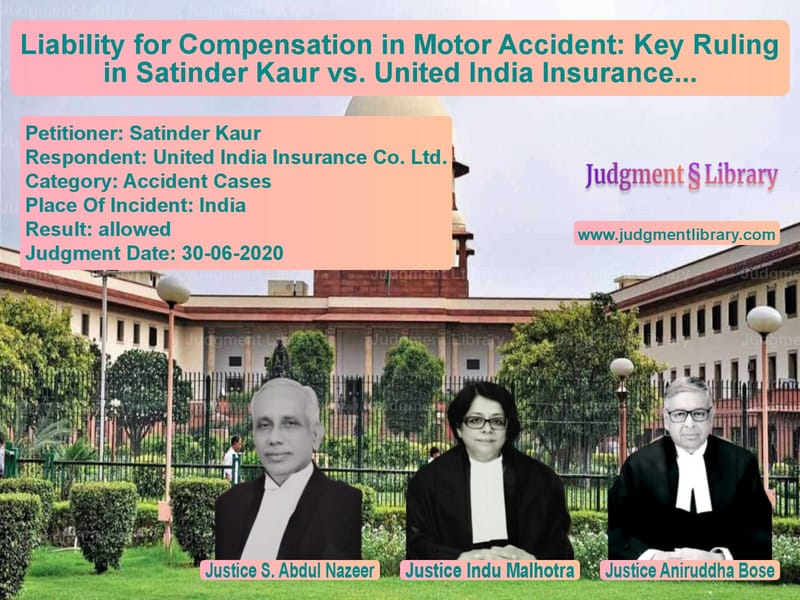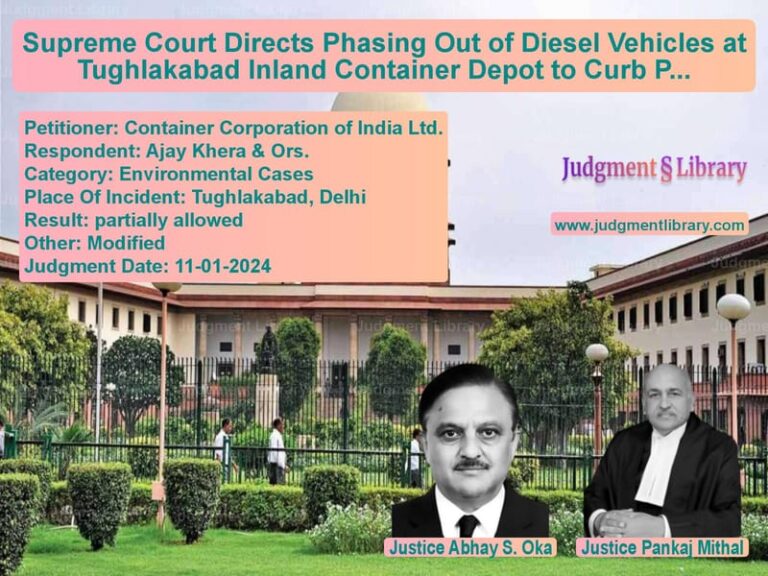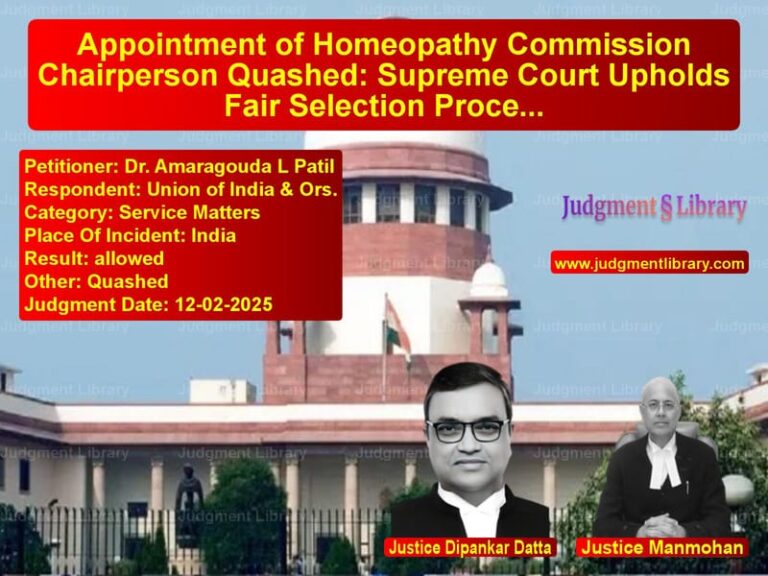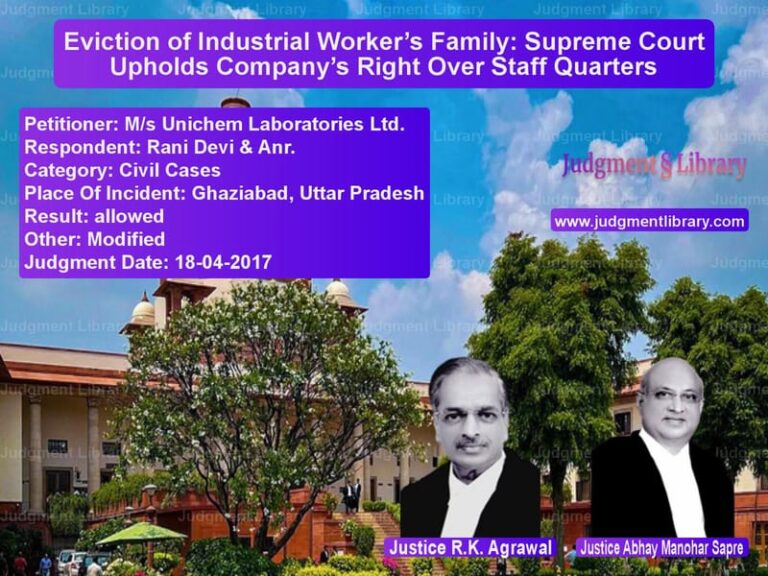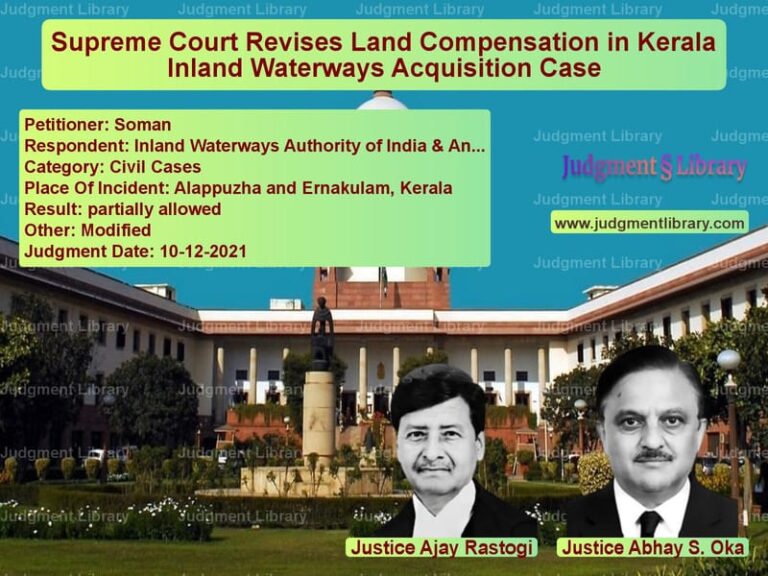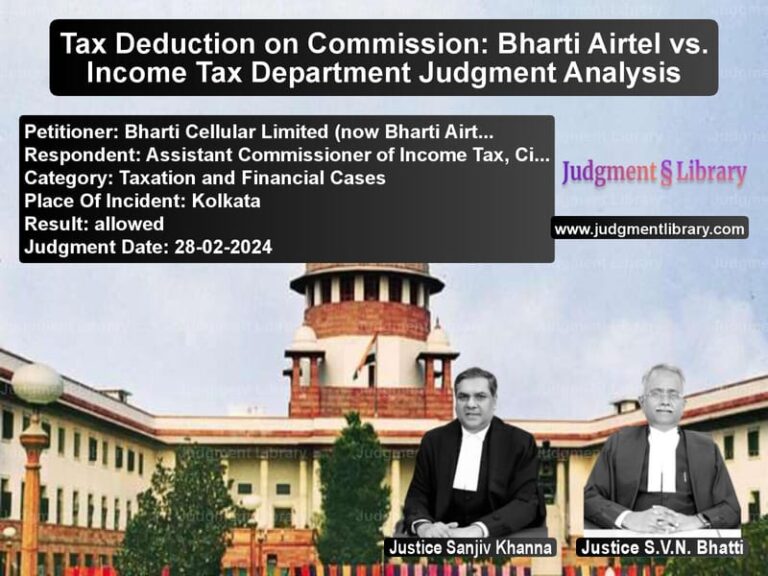Liability for Compensation in Motor Accident: Key Ruling in Satinder Kaur vs. United India Insurance Co.
The case of United India Insurance Co. Ltd. vs. Satinder Kaur & Ors. revolves around a tragic motor vehicle accident that occurred on 18th November 1998, resulting in the death of Satpal Singh, a resident of Doha, Qatar. The accident took place while the deceased was visiting India. He was riding a scooter with his wife as the pillion rider when a collision occurred with a Maruti car, causing the death of Satpal Singh and severe injuries to his wife. The case addresses the issue of compensation for the victim’s dependents and how the Court applies legal principles to assess the quantum of compensation for such accidents.
The primary issue in the case was to determine the liability of the insurance company and how the compensation should be calculated, particularly in relation to the income of the deceased, the loss of dependency, and the application of the multiplier method. The Family’s claim for compensation had been made under Section 166 of the Motor Vehicles Act, 1988, and sought a total of Rs. 50 lakhs in compensation, which was initially awarded by the Motor Accident Claims Tribunal (MACT) and later enhanced by the High Court.
Background of the Case
The deceased, Satpal Singh, was a skilled laborer employed in Qatar. He had been residing in Doha since 1984 and had a stable job, earning a salary of 750 Qatari Riyals per month when he first started working. He continued to stay in Qatar until his unfortunate death in 1998. The accident occurred while he was visiting his family in India. The FIR stated that the accident took place when Satpal Singh was overtaking a tractor-trolley, and a Maruti car coming from the opposite direction collided with him. The accident caused his immediate death, and his wife suffered severe injuries, including permanent disability of 25%.
The claimant, Satinder Kaur (the wife of the deceased), filed a claim petition before the MACT for compensation, seeking a total of Rs. 50 lakhs along with interest at 18% p.a. The petition also included the claim for the victim’s medical expenses, loss of estate, and the injury to the wife. The MACT initially awarded a compensation of Rs. 1.9 lakh, which was based on the income assumed by the tribunal for the deceased’s job as a skilled worker.
However, the widow, along with the children, filed an appeal before the High Court, seeking an enhancement of the compensation. The High Court, after reviewing the evidence, held that the income of the deceased, based on a letter from his employer in Qatar, was much higher than what the MACT had calculated. The High Court assessed the deceased’s income at Rs. 2.68 lakh per month, considering the letter and other supporting documents. The Court applied the multiplier method and further considered the loss of dependency, loss of consortium, and other relevant heads of compensation.
Legal Provisions and Key Issues
The case primarily involves the application of the following legal provisions:
- Section 166 of the Motor Vehicles Act, 1988: This section deals with the filing of claims for compensation in cases of motor accidents resulting in death or injury.
- Multiplier Method: The method used to calculate compensation based on the deceased’s age, income, and number of dependents.
- Loss of Dependency: The loss of financial support to the dependents of the deceased, calculated based on their contribution to the family.
The main legal issue was to determine the income of the deceased, as there was a lack of concrete evidence for the actual earnings of Satpal Singh at the time of his death. The Court had to rely on documents like the letter from his employer and the deceased’s passport entries to estimate his income.
Arguments of the Petitioner
The petitioner, Satinder Kaur, presented the following arguments:
- The compensation awarded by the MACT was inadequate and did not consider the actual income of the deceased, as shown in the letter from his employer in Qatar.
- The deceased was employed in Qatar for over 14 years and was drawing a substantial salary, which should be factored into the compensation amount.
- The loss of dependency to the family was significant due to the sudden and untimely death of the breadwinner, and the compensation should reflect the same.
- The claimant also sought compensation for the permanent disability suffered by the wife, Satinder Kaur, due to the accident.
Arguments of the Respondent
The respondent, United India Insurance Company, presented the following arguments:
- The letter from the deceased’s employer regarding his salary was not attested by the Indian Embassy in Qatar and should therefore not be considered as valid evidence.
- The compensation awarded by the MACT was appropriate, and the claim for enhancement was excessive.
- The insurance company should not be held liable for an enhanced compensation amount, as the calculations based on the income of the deceased were already reasonable.
Judgment of the Supreme Court
The Supreme Court reviewed the case and made the following key observations:
- The Court rejected the authenticity of the letter dated 27th June 1997, which claimed that the deceased was earning $6,700 per month. The Court found the document to be suspicious due to its unverified nature and the lack of attestation by the Indian Embassy.
- The Court agreed with the High Court’s approach of estimating the deceased’s income using a notional increase of 10% per annum from his original salary of 750 Qatari Riyals per month, which would result in a monthly income of 2,600 Qatari Riyals.
- The Court applied the multiplier method, taking into consideration the deceased’s age (40 years) at the time of death. The Court selected a multiplier of 15, as per the guidelines laid down in Sarla Verma v. Delhi Transport Corporation.
- The Court also added 30% to the income of the deceased to account for future prospects, in accordance with the ruling in Pranay Sethi v. National Insurance Co. Ltd..
- The total compensation was determined as Rs. 39,65,125, which included loss of dependency, loss of estate, loss of consortium, funeral expenses, and other heads. The Court deducted 50% from the total amount due to contributory negligence on the part of the deceased.
Impact of the Judgment
This ruling has significant implications for future cases involving compensation claims in motor accident cases:
- The judgment clarifies the method for calculating compensation for loss of dependency, especially when there is insufficient evidence of the deceased’s income.
- The Court’s decision to add future prospects to the deceased’s income provides a fairer approach to compensation, considering inflation and the potential for salary increases.
- The case also sets a precedent for the treatment of documents in foreign jurisdictions and emphasizes the need for proper attestation and verification of such documents.
Conclusion
The Supreme Court’s judgment in Sri Satinder Kaur vs. United India Insurance Co. Ltd. highlights the challenges in determining fair compensation in motor accident cases. By applying the multiplier method and considering future prospects, the Court ensures that the compensation reflects the true loss to the family. This case serves as an important reference point for similar cases in the future, setting a standard for the calculation of compensation in cases of death caused by motor vehicle accidents.
Petitioner Name: Satinder Kaur.Respondent Name: United India Insurance Co. Ltd..Judgment By: Justice S. Abdul Nazeer, Justice Indu Malhotra, Justice Aniruddha Bose.Place Of Incident: India.Judgment Date: 30-06-2020.
Don’t miss out on the full details! Download the complete judgment in PDF format below and gain valuable insights instantly!
Download Judgment: Satinder Kaur vs United India Insuran Supreme Court of India Judgment Dated 30-06-2020.pdf
Direct Downlaod Judgment: Direct downlaod this Judgment
See all petitions in Road Accident Cases
See all petitions in Compensation Disputes
See all petitions in Motor Vehicle Act
See all petitions in Negligence Claims
See all petitions in Judgment by S. Abdul Nazeer
See all petitions in Judgment by Indu Malhotra
See all petitions in Judgment by Aniruddha Bose
See all petitions in allowed
See all petitions in supreme court of India judgments June 2020
See all petitions in 2020 judgments
See all posts in Accident Cases Category
See all allowed petitions in Accident Cases Category
See all Dismissed petitions in Accident Cases Category
See all partially allowed petitions in Accident Cases Category

